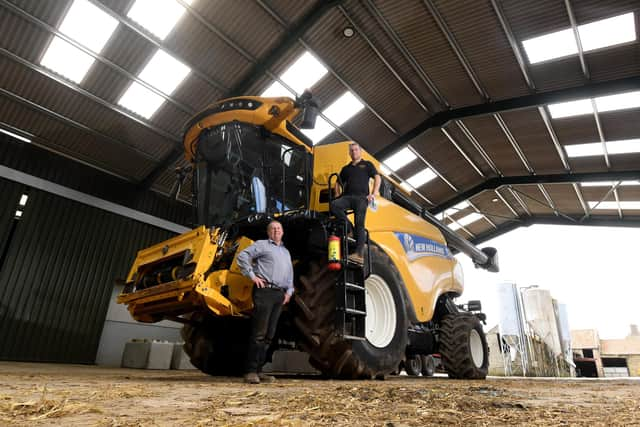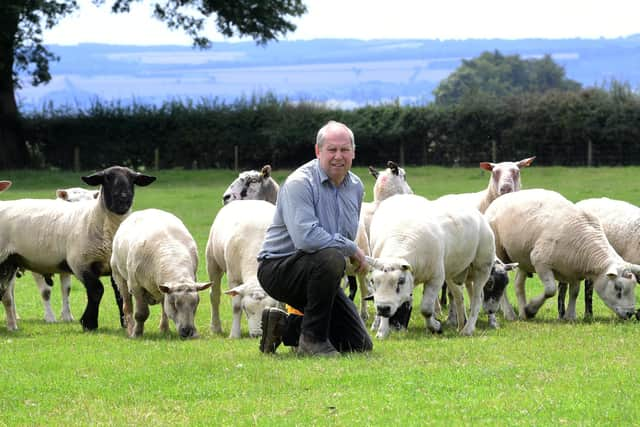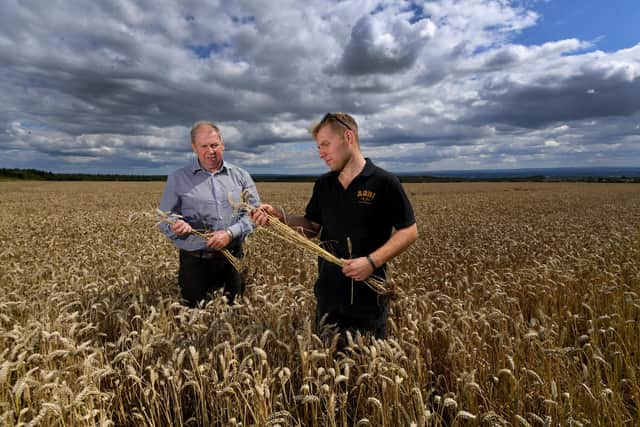Farm of the Week: Combine harvester accident bump in the road for Yorkshire estate tenant farmer
When David had unblocked his combine during harvest in 2017 and the spanner needed one good pull to get everything back in place he made what proved to be a catastrophic move.
“I was 54, thinking I was 24, but even then it would have been the wrong decision,” says David, now six years on from that fateful day.
Advertisement
Hide AdAdvertisement
Hide Ad“We, my son Jamie and I, had the spanner to its highest point. All it needed was one good pull. That’s when I jumped up with both hands. The spanner came off, I fell into the combine, knocked myself out and when I came round I couldn’t get up. My foot was 90 degrees where it shouldn’t have been. Thanks to my wife Karen who is a qualified first aider, Yorkshire Air Ambulance and a dose of ketamine I was airlifted to James Cook Hospital.


But that wasn’t the end of David’s drama as surgeons at the hospital discovered he also had a heart condition.
“It ended up being a good thing in a fashion because they found my heart condition, which I finally had sorted out last December,” says David.
David is clearly a farmer whose glass is always half full rather than half empty. He’s a refreshingly positive likeable man who isn’t short on showering praise.
Advertisement
Hide AdAdvertisement
Hide Ad“Jamie now does most of the heavier and more strenuous jobs on the farm today and was tremendous while I was out of action.


David and Jamie work together on Wether Cote Farm, Skiplam just north of Beadlam on the Nawton Tower Estate.
“I’m the third generation to farm here and Jamie will be the fourth. We’re a predominantly arable farm with sheep, and keep pigs on bed and breakfast.
“The farm runs to 900 acres of which 750 is down to winter wheat, winter barley, winter oats, oilseed rape, spring beans and spring oats. We have 350 Mule ewes and 3500 pigs at any one time.
Advertisement
Hide AdAdvertisement
Hide Ad“We top out at 850ft above sea level and our lowest point is about 700ft so we’re a high arable farm and grow crops up to the highest point.


David explains how the arable and livestock operation works on a farm that some might regard as more favoured for livestock.
“The arable side is the most important part of our business. I look at our operations as being part of a cartwheel and crops have the biggest share of the wheel. We also need the arable crops for the straw for the pigs, and the pigs for the manure.
David’s cropping for this year’s harvest once again saw winter wheat as his main crop.
Advertisement
Hide AdAdvertisement
Hide Ad“We grew around 340 acres of winter wheat varieties Gleam, Champion and Dawsum. We had a tremendous year last year. I’ve never known so much grain come off the farm. Dawsum is new to us. We cut the first of it yesterday and it looks really well.
“We go for stuff that doesn’t fall over. We take advice. Our guys who we get our seed from said Dawsum would suit us.
“We’ve harvested 135 acres of winter barley. We have grown Kingsbarn six-row hybrid for eight years and it hasn’t let us down.
“Our oats variety is Mascani. We grow 95 acres. That variety is all Morning Foods want. It’s a fairly old variety. We’ve grown it six or seven years.
Advertisement
Hide AdAdvertisement
Hide Ad“Our other crops for this year’s harvest were 75 acres of oilseed rape; 56 acres spring beans; 20 acres spring oats; plus 130 acres of stubble turnips for the sheep. We also let 20 acres for potatoes to Andrew Russell of Sproxton this year. He used a field that hasn’t grown a potato since 1988 growing set (seed) potatoes.
Perhaps understandably arable farming at the height the Teasdales far has its problems as well as its positives.
“We don’t get flooded that’s for sure,” says David. “But we do suffer drought. We also don’t have much soil to work with. We’re on limestone and after six to seven inches of soil it’s just solid rock.
“We don’t do min-till. We’ve tried it but it wasn’t for us. So, we still plough and power harrow. There’s not a lot to plough into. We run a Kuhn reversible which is auto-reset because of the rock, and flick it over at the rock surface.
Advertisement
Hide AdAdvertisement
Hide AdDavid says that he is very much a believer in looking after the soil.
“Jamie and I are very conscious of our soil and its quality. If you don’t look after your soil you haven’t got a business, if you don’t treat that right you don’t get the yield, you don’t get the straw, you don’t get the profit.
“We’ve cut down on bagged fertiliser by using variable rate application and we’ve even cut down on manure application to 8 tonnes in some fields. We also work with SOYL and Procam on soil sampling showing an ongoing record of what we’re putting into the soil and what we need to put in.
The Teasdale livestock enterprise has changed markedly since the days when David’s late father Gordon was alive.
Advertisement
Hide AdAdvertisement
Hide Ad“We used to run 200-head of cattle,” says David. “Dad used to buy and sell at markets three days a week. We went out of them with the Mad Cow carry-on because it just jiggered the prices, but we’ve been in pigs 35-38 years.
“We always had a few sows and a breeding herd, but now we just do 7 to 40 kilo weaners. We are an all-straw based yard. We’re a big user of straw through the pigs that are housed in buildings that are all Farm Assured.
“Our sheep are all Mules and graze down into Sleightholme Dale. We buy 50-70 replacements every year off Stuart Wood of Bilsdale.
“We used to lamb starting from 25 March to 1 April, but for the last four or five years we’ve gone to 15 April. We just find it so much easier. We have grass at that time and can turn them out. We don’t use a lot of concentrate. The only thing we put straight through the market today are the cull ewes that mainly go to Darlington because my cousin Stephen Dodsworth works there.
Advertisement
Hide AdAdvertisement
Hide AdDavid says that Jamie is perhaps grasping the environmental banner more than he, but that he’s happy to be going that way too.
“We are five years into an ELS scheme and did a tremendous amount of hedging last year and fencing. We have game cover, beetle banks and stony areas where things seem to thrive. We do a lot of coppicing. We’re going to do lot of hedgelaying, which we are very much into.
“We’re here to look after the land and the countryside and this spring we’ve seen hundreds of yellowhammers.
It’s a certainly happier life for David and his wife Karen than that combine incident six years ago and it was made even happier earlier this year when their daughter Becki married Jim-Bob Dunn from Bransdale.